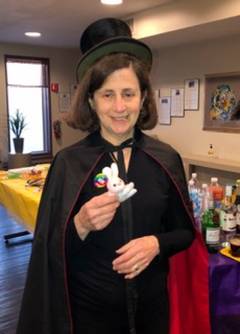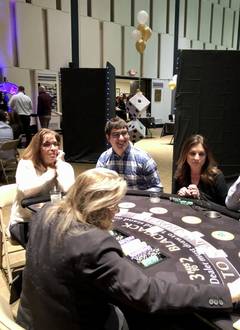Passover 5779: A Memorable Night
04/24/2019 02:25:55 PM
Apr24
| Author | |
| Date Added | |
| Automatically create summary | |
| Summary |
Among the commentary and news items that circulate leading up to each major Jewish holiday, one piece stood out. [Available here: https://forward.com/life/faith/422792/american-jewish-teens-passover-seder/ ] Dr. Arielle Levites is a scholar of Jewish education, and she and her colleague Dr. Liat Sayfan recently completed a soon to be published study about today's Jewish teenagers. They surveyed more than 17,000 American Jewish teens, the largest such data set ever collected, in order to learn “how teens' participation in Jewish activities related to their attitudes toward being Jewish, as well as to their sense of connection and responsibility to others.”
Levites wrote this week about one of the striking findings of the study. “Jewish teens,” she wrote, “who reported regular attendance at a Passover Seder rated themselves higher on almost every outcome we measured. The effect was small but remarkably consistent. ... The Passover Seder, statistically speaking, outpaced many other childhood activities we measured - including those that required much more intensive commitments of time and resources.”
There is something about Passover it would seem that is particularly sticky, something about it that has a small but significant correlation and perhaps even causation to all other measures of Jewish identity. Thought it is only one or two nights a year, the seder punches above its weight.
Levites suggests several reasons for this. The first connects to one of the major findings of their research, that Jewish teens today generally like and admire their parents, and see their families as the major source and incubator for their own Jewish identity and values, which they see as consistent, rather than conflicting with, their parents'. In other words, the teens in the survey associated being Jewish and doing Jewish things with their particular family, rather than a larger community of which they are a part.
So given the primacy of a family-based sense of Jewish identity, it makes sense that the Passover seder, as a home-based ritual, would be particularly important, as opposed to, say, Yom Kippur services. Furthermore, the flexibility of the seder, each family observing it in their own idiosyncratic way, contributes to this association between family and Jewish identity.
Part of this flexibility also relates to who is around the table. The seder, with its invitation that “all who are hungry may come and eat,” can be made accessible to today's complex Jewish families, which more often than not today include non-Jewish relatives and friends. At its core, the seder is a family meal, recognizable to people of any background. This may also account for the popularity and impact of the seder.
Finally, the seder creates a memorable moment of inter-generational connection, where two or three or even four generations come together to share an experience. As Levites writes, “American Jewish teens, perhaps like all teens, want opportunities to talk with their families about what matters most in life. The Seder is an extraordinary family dinner that helps teens and their families do just that.”
All of this, of course, is by design. The purpose of the seder is to tell and re-tell the story of leaving Egypt on through the generations. I was so moved this week at the classroom seders our ECP children held, where I watched this happen live. Each room had its own craft projects and special Haggadot and theatrical productions in which they told and retold the story of Passover. It was so moving to see all of these parents take off from work in the middle of the day to be present for the classroom seder.
This intergenerational transmission is what Passover is all about. Just after the passage we read this morning, the Torah commands us, “And you shall explain to your son on that day, ‘It is because of what the LORD did for me when I went free from Egypt.'” We are to each personally feel that we left Egypt, and then convey that feeling to the next generation.
The whole seder is designed to facilitate this process, beginning with the four questions which use a child to kick-off the night's dialogue. But there are some other, lesser known ways that the seder was meant to engage children, long before the advent of plastic frogs or 10 Plagues finger puppets.
The Talmud (Pesachim 109a) suggests that, since the children do not drink the 4 cups of wine, the adults should distribute roasted grains and nuts to hold the children's attention, so that they will remain awake and attentive, and ask about the proceedings. No less an eminence than Rabbi Akiva is reported to have done so.
The Talmud also reports lifting the seder plate and grabbing the matzah as other unusual practices designed to spark curiosity among the children present about why this night is so different from others. Also, as time went on, the purpose of some of the seder customs, which were adapted from the Greco-Roman symposium, became obscure. So, doing something unusual to arouse the curiosity of the children became a convenient way to explain these customs whose original purpose had been lost.
This practice of distributing nuts and roasted grain�"or, what we would call today candy--became codified in Jewish law. One commentator (Mishnah Berurah on OH 472) elaborates that the purpose of this custom is to keep the children awake until at least Avadim Hayinu, which is the beginning of the response to the four questions asked by the child. Making sure the children hear this part of the Haggadah�"how we were slaves in Egypt until God set us free-- is the essence of the commandment of Passover. At the very least, the children should understand that the unusual practices they see all around them are connected to the story of leaving Egypt.
That commentator then includes an editorial comment where he rails against the practice he observed in his own day�"late 19th and early 20th century Belarus�"of families who would have their children recite the four questions and then dismiss them to go to sleep before they could hear the answer. This defeats the whole purpose, in his view. His point is that the seder should not just be a perfunctory ritual or performance, but a real exchange between the generations.
And so it is for us today: children and teens take what they experience during the seder and apply it to everything else in their lives. The seder, as it should be, stands at the core of their Jewish identity, a beautiful and holy mixture of family, ritual, story and sensibility. As we sit around the seder table once again tonight, may we keep in mind the sacred transmission that the ritual enables.
Sat, November 8 2025
17 Cheshvan 5786
Photo Gallery
Photo Albums
Sat, November 8 2025 17 Cheshvan 5786
Upcoming Events
All Events
-
Friday ,
NovNovember 14 , 2025Give Thanks at Tot Shabbat 2025
Friday, Nov 14th 5:30p to 6:30p
-
Tuesday ,
NovNovember 18 , 2025Women's Rosh Chodesh Group
Tuesday, Nov 18th 12:00p to 1:30p
New Women's Rosh Chodesh Group Tuesdays, 12:00-1:30pm Gather with Cantor Sklar and KTI friends at the start of each month of the Hebrew calendar to learn about the themes and traditions of the coming month. Learn from each other, learn more about each other and better understand the women within our tradition. Enjoy music and lunch together! Please a dairy or parve lunch to enjoy at noon, followed by the discussion at 12:30pm. KTI will provide drinks and dessert. RSVP Appreciated -
Wednesday ,
NovNovember 19 , 2025Rabbi, May I? Modern Responsa
Wednesday, Nov 19th 10:00a to 11:30a
Wednesdays, 10 - 11:30 AM, KTI Library Ever since Abraham’s famous argument with God, Judaism has been full of debate. Moses and Korah, David and Nathan, Hillel and Shammai, the Vilna Gaon and the Ba’al Shem Tov, Spinoza and the Amsterdam Rabbis . . . the list goes on. No wonder that Judaism cherishes the expression machloket l’shem shamayim, “an argument for the sake of heaven.” Beyond their historical importance, what makes these disputations so compelling is that nearly all of them, regardless of their epochs, are still being argued. The parade of characters spanning three millennia of biblical, rabbinic, and modern disputation reflects the panorama of Jewish history with its monumental political, ethical, and spiritual challenges. This series will examine Jewish responses to exile from the biblical period to our modern day. Considering texts from all genres of Jewish literary creativity, we will explore how the realities and iterpretaions Join as we re-open these timeless debates that lead us to the core of 3,000 years of Jewish conversation. • Justice: Abraham vs. God (October 19) • Holiness and Authority: Moses vs. Korah (November 9) • Inclusion: The Five Daughters vs. the Twelve Tribes (November 30) • Accountability and Morality: David vs. Nathan (December 21) • Resistance: Ben Zakkai vs. the Zealots (January 18) • Law: Hillel vs. Shammai (February 15) • Spirituality: The Vilna Gaon vs. the Baal Shem Tov (March 15) • Boundaries: Spinoza vs. the Amsterdam Rabbis (April 19) • Religious Evolution: Geiger vs. Hirsch vs. Frankel (May 10) • Zionism: Herzl vs. Wise (May 31) -
Wednesday ,
NovNovember 19 , 2025Wrestling with God
Wednesday, Nov 19th 8:00p to 9:30p
Wrestling with God Wednesdays, 8-9:30 PM Congregants’ homes TBA We need to talk about God. And about how we talk, and don’t talk, about God. It’s a big topic, maybe the biggest. This offering invites adult learners into compassionate inquiry, deepening their relationship to Jewish text through collective exploration. Using the album s*ngs ab-ut g?d [https://open.spotify.com/album/6JEY2AN6awAxNfWwmXX460] by Jewish educator Eliana Light as a starting point, this series blends music, Hebrew text study, and open-ended questions to help participants examine their own connections to the divine. This is sacred work. It’s not about getting it right. It’s about showing up with curiosity, humility, and a willingness to join the long lineage of Jews who wrestle with God. Each session stands alone, but we’d love to have a consistent group as much as possible. Dates: September 10: skyman October 22: shadows November 19: in the silence December 10: if only January 21: lead me back February 11: three steps March 11: beyONEd April 29: the mountains May 20: the name June 17: I rise -
Thursday ,
NovNovember 20 , 2025Coffee with the Rabbi
Thursday, Nov 20th 8:00a to 9:00a
Start your morning with some caffeine and casual or meaningful conversation! Join Rabbi Goldberg for a Coffee Chat! Stop by Rye Ridge Starbucks any of the following Thursdays, between 8-9am: June 12 and 26 July 10 and 24 August 7 and 21 September 4 and 18 October 16 and 30 November 6 and 20 December 4 and 18
Privacy Settings | Privacy Policy | Member Terms
©2025 All rights reserved. Find out more about ShulCloud






